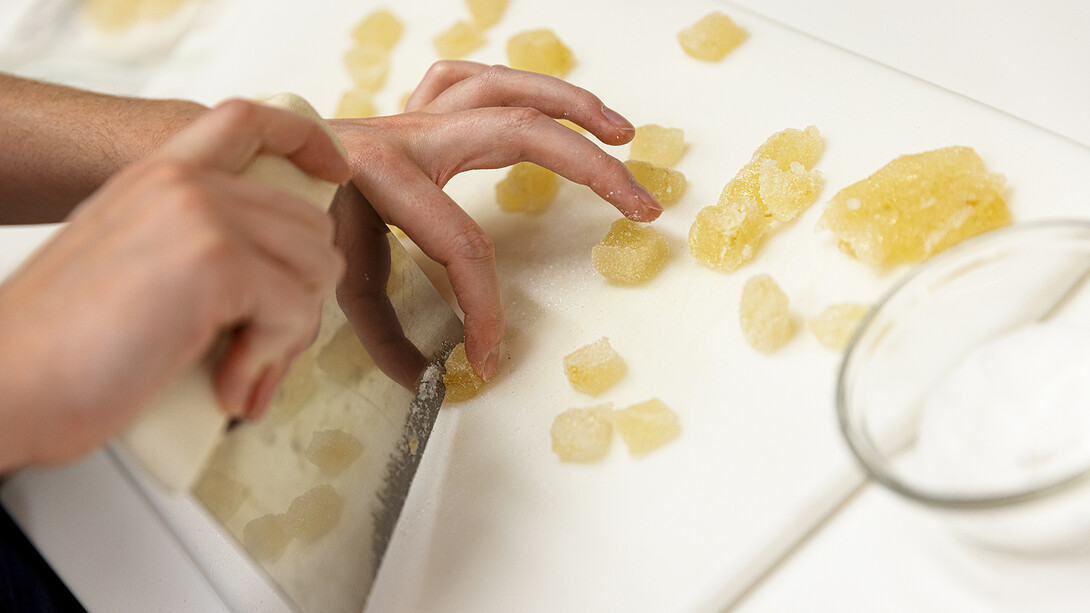
A program launched by a student experience is helping Huskers in food science and technology majors gain hands-on experience while making positive real-world impacts.
Offered through the University of Nebraska–Lincoln’s Department of Food Science and Technology, the Food Processing Center’s Student Rotation program allows undergraduates to participate in four lab experiences. Those labs — dairy plant, pilot plant, product development lab and sensory lab — were first completed by a student who just happened to take them through the four years of her collegiate career.
Russell Parde, manager of the pilot plant, said the department took note of how much the student gained from the four-lab experience and took action.
“I think her experience here was kind of…a light bulb for us, and that we can kind of hopefully replicate her experience many times because it was just so valuable for her and for us,” Parde said.
Nebraska’s April Johnson, a senior food science and technology major from Albion, has been a part of the rotation program since January 2020. In that time, she has gained a wealth of food science experiences.
“I just kind of was like, ‘OK, this seems like a unique opportunity. I should apply for this,’” Johnson said. “It’s been really great. I’ve gotten a lot of hands-on experience because of that.”
The Food Processing Center’s proximity to her classes and the opportunity to shift through a variety of workspaces sold Johnson on the internship.
“I just tried to seize every opportunity in the food science department that I could,” Johnson said.
Johnson started out in the dairy plant producing ice cream for the university’s legendary Dairy Store. She occasionally popped into the pilot plant where she’d help them clean the machines after projects before finally settling in the product development lab. During summer 2020, she even assisted the Husker team that helped produce more than 200,000 gallons of hand sanitizer in response to the COVID-19 pandemic.
In addition to working with the rotation program, she has also been a teacher’s assistant and contributed to research projects. Johnson first came to the university as an undeclared major. Now, she can confidently say that she will be pursuing the food science path upon graduation thanks to the wealth of experiences she had as an undergrad.
Students like Johnson can begin working in the rotation program at any point of their collegiate career — allowing for some Huskers to get in the door as early as their first year. The idea is something that Parde sees as a mutually beneficial plan for students and the Food Processing Center.
“That way we can train them throughout their career, throughout their student life…and have them be more valuable to us, and in return they’ll get more value out of a position,” Parde said.

By placing undergraduate students at the helm of production and research projects, the plant is proving their trust in the food science & technology program. Additionally, they are supplying the food science industry with worthy interns and full-time employees that already have ample amounts of experience in real-world work settings.
“It’s really important for students because they get that hands on experience, and it’s a little bit more real world,” said Sara Roberts, student service coordinator for the department.
Roberts noted that there are a variety of opportunities for students within food science and technology seeking work experience. Along with working in the Food Processing Center, they can also reach out to faculty members to see if there are any open positions in their labs.
One senior, Ellenor Sell, did just that — and they’ve been working in their lab ever since. They wanted to strengthen their skills and be better prepared for the workforce, and their laboratory internship has let them do just that.
“I think I’ll be better prepared but I also think I’ll meet the requirements of work experience for most jobs,” Sell said.
Roberts said that she has noticed an uptick in students seeking out internships within the department. Many have come to realize both the impact that work experience has on a resume, but also the plentiful opportunities that are available to them as University of Nebraska–Lincoln students.
She even noted that if students can find an open availability in a faculty member’s lab, many times the faculty member will seek out other open spaces in another lab for said student. The culture of inclusion and connectedness is alive in the Department of Food Science and Sechnology — and students are greatly benefitting from it.
“It’s pretty cool for students to get the opportunity of working here,” Roberts said.







